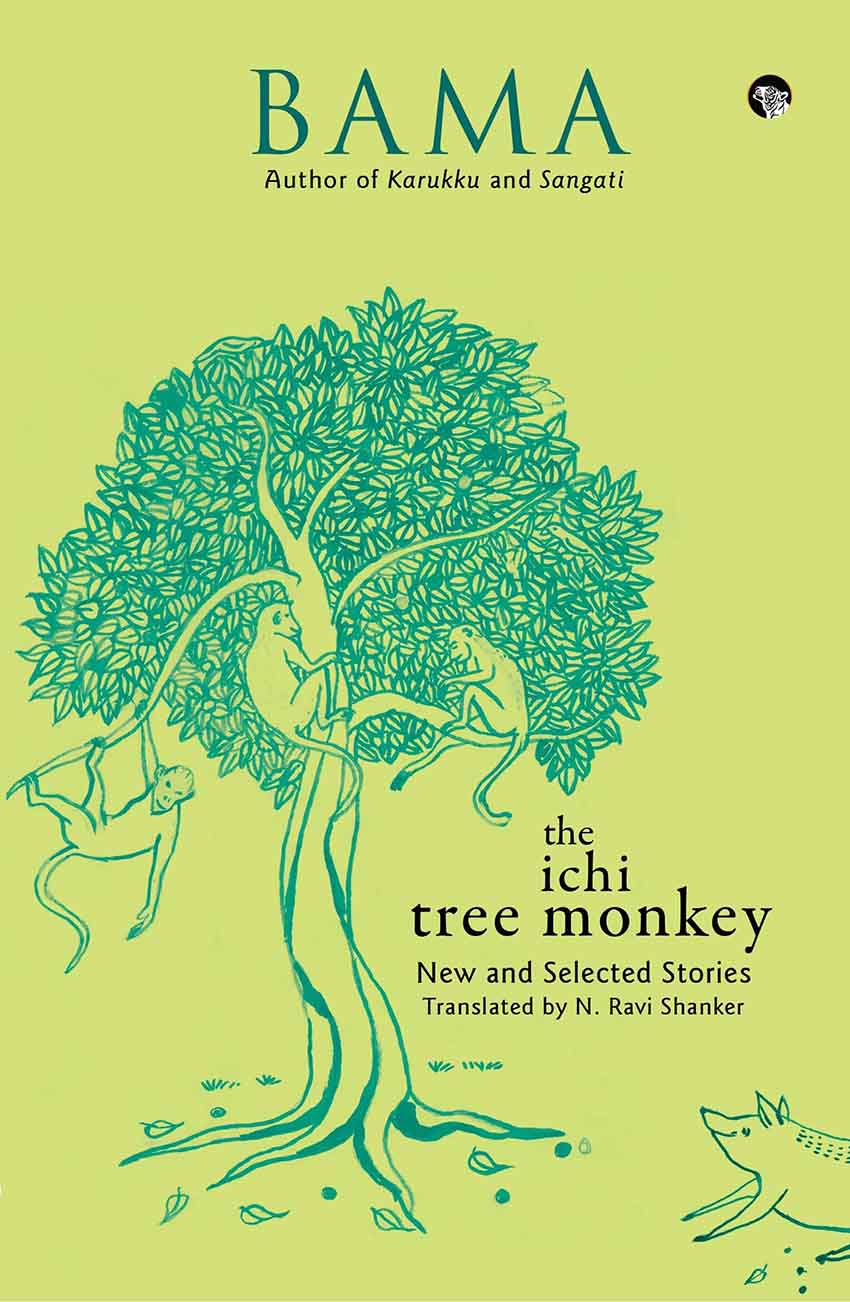Book Title: The Ichi Tree Monkey: New and Selected Stories
Author: Bama
Translator: N Ravi Shanker
Published by: Speaking Tiger
Genre: Literary Fiction, Translated Indian Literature, Short Story Collection
Book summary:
‘[Bama has] painted the Tamil-Indian village from the perspective of the cheri (Dalit colony), thus turning the socio-cultural geography upside down.’ —The Hindu
From the author of the widely acclaimed novels Karukku and Sangati, this is a fiery, feisty collection, comprising all the stories from her acclaimed book Kusumbukaran and new ones written for this volume. Set among the Dalits of rural Tamil Nadu, these stories display the full potential of the ‘weapons of the weak’—small, everyday acts of rebellion, sharp, irreverent humour and a determination not to be crushed and extinguished. Pachayamma in ‘Chilli Powder’ taunts the rich landlady Gangamma by collecting fodder only from her fields, despite dire threats, and laughs in the face of blustering policemen. The handsome and audacious young Ammasi leaves a landlord fuming in impotent rage by calling him his brother. A pig and a monkey debate which of them deserves a higher status. A ghost demands whisky and insists he has no caste.
Bama’s prose bristles with the raw energy and vitality that comes from living close to the ground, and Ravi Shanker’s translations retain all the power, wit and brilliance of the originals.
About the Author:
Bama’s path-breaking childhood memoir Karukku (1992) established her as a distinct voice in Dalit literature. The English translation of Karukku won the Crossword Prize in 2001. Bama is also the author of the acclaimed novels Sangati and Vanmam and the short story collections Kusumbukaran and Oru Thathavum Erumaiyum.
About the Translator:
N Ravi Shanker translates from Malyalam and Tamil into English. Also a poet, he has published three collections of poetry.
My Review:
The Ichi Tree Monkey: New and Selected Stories by Bama, translated by N Ravi Shanker is the latest short story collection that tells you exactly how the contemporary Indian literary scene is shaping up: diverse, enriching and just bursting with a life force that is just difficult to not succumb to! The collection of 15 short stories in the book are entertaining and playful while some brings out a flavour to the mundane that is unique. But there are also those that are politically relevant with their undertones of caste commentary as seen from the perspective of a low caste and then moving towards how within those living under the oppression of the high caste, there is an inherent internal prejudice within.
Bama writes her characters with a flair and a vibe that makes them relatable to readers: they are eccentric, they are pig headed, they are stoic, they suffer, some fall down but pick themselves up. They are everyday people caught in the larger schemes of life and where society boxes them in, they are not ones to fade into nothingness. There are stories set in only the domestic sphere that frames the question of women’s agency and how domestic violence is pushed away as something that is best left to individuals, something that happens in the exact manner in real life in the country today. The stories around the politics of caste and how one’s caste builds or demolishes individual personalities and identities are written in a manner that they don’t become angry outbursts but examine the fault lines within socio cultural systems.
It would be a difficult, nay an impossible task to pick out a favorite story for each one is fleshed out in their own individual glory. Two stories stand out for me: Empty Nest follows a character’s play of emotions as she feels an emotional connect with the travails of a sparrow family and wrestles over whether to accord the same to a human being. It reads like a simple story, looking at how most people tend to be all touched by something sad when it is far removed from ourselves and then being totally unseeing of human suffering or seeing it but not wanting to do something about it all for that would take a lot more than just offering emotions.
‘Single’ neatly tackles how a woman is considered incomplete because of a physical health condition that marks her as a butt of mockery, fake concern etc but how an act of aggression puts an end to the social disdain. It is a story that will leave readers thinking at the story and turn of how things play out. All in all, this is a collection that is simple on the surface but one where each brings out the complexities of the characters and their lives. The writing flows like an unruly stream of words but knowing well just where it is going and why.












